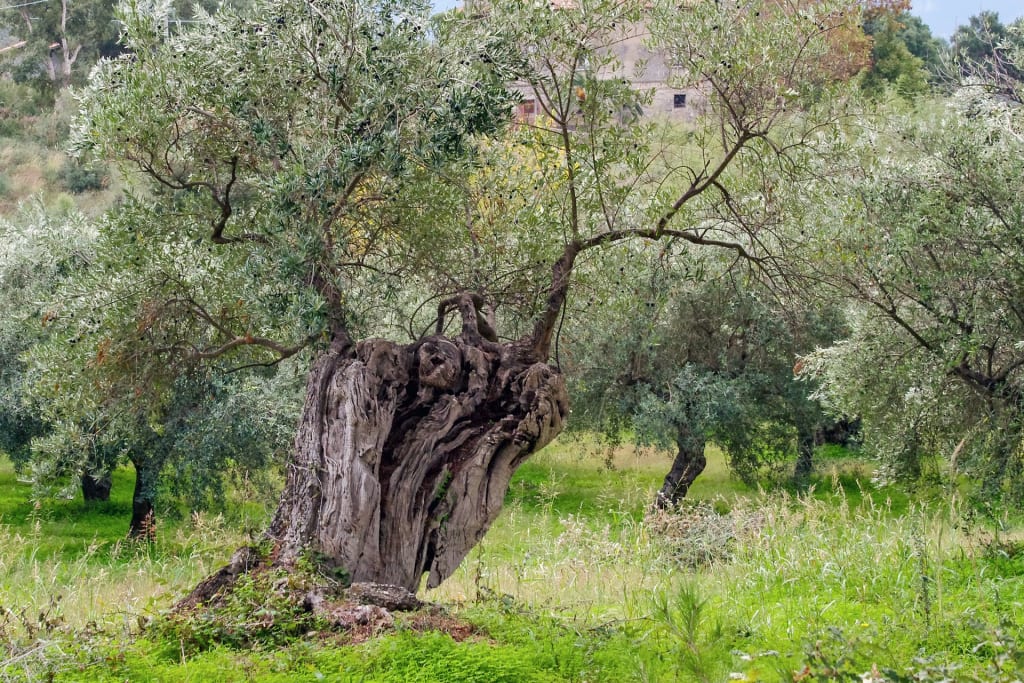
According to Greek mythology (every religion is a mythology whether one accepts it or not), the creation of the olive tree was the result of a contest between Poseidon, God of the Sea, and Athena, Goddess of Wisdom (I love her), as to who would become the protector of a newly built city in Attica (the historical region of Greece). The city would then be named after the god or goddess who gave the citizens the most useful and divine gift. With his trident, Poseidon struck a rock and water rushed out of it, creating a spring of salty aqua, symbolizing his gift of sea power. Beautiful Athena struck a rock with her spear and produced the olive tree, an offering signifying both fruitfulness and peace. The citizens showed their wisdom by choosing Athena’s gift and she forever became the protector of the city, Athens, named after her. Even today, an olive tree stands where the story of this competition is said to have taken place. It is repeated that all the olive trees in Athens are descended from that first olive tree offered by Athena,” a goddess after my wooden heart. I want to thank R Tsambounieri Talarantas for reminding me of the olive tree and its Goddess Athena connection ((giggles)). But it is not funny, you may think. Actually, it is my funnest story about a tree, and I love olives, especially the Kalamata, the most nutritious olives on our pale blue dot.
The olive tree (Olea europaea) is a subtropical, broad-leaved evergreen of the Oleaceae family. Its magnificence has been rhapsodized for millennia. The tasty olive was grown on the island of Crete at around 3,500 BCE. Olive oil was prized for anointing the body in Greece during the time of Homer, and it was an important crop of the wily Romans from around 600 BCE. Later, olive tree growing spread to all the countries bordering the Mediterranean, and the tree was also planted in suitable climates for its inherent beauty.
The olive tree ranges in height from 3-12 metres (10-40 feet) and has numerous inspiring branches. Its healing leaves, Athena’s spear-shaped, are dark green above and silvery on the underside and are paired opposite each other on the twig like inseparable lovers. Its meat (wood) is resistant to decay, and if a part of it dies from chronic sadness, a new trunk tends to arise from its roots which seem to be always happy, almost oblivious to what is happening above ground.
Olive trees bloom in late spring, just before summer’s heat, with small, milky-coloured flowers which appear in two sorts. One contains both male and female parts, capable of developing into lovely olives, and the other, only male, containing the pollen-producing part since the olive tree is wind-pollinated, and it sings, apparently only in Ancient Greek. The olive fruit setting may seem unpredictable. In some areas, especially where irrigation and fertilization are not used, bearing olives in alternate years is usually the rule. The olive tree may offer a generous crop one year and not even bloom on the next. I salute its independence.
Olive trees start bearing their heavenly fruit within 4-8 years, but full, human-geared, tireless production is not reached until 15-20 years. Olives for oil extraction are allowed to mature, but for processing as food, immature ones are picked or shaken off the trees. The poor olive trees may think that there is an earthquake each time. Humans are even worse than earthquakes. What a sad fact! Hundreds of named varieties of both types of olives are grown in warm climates.
Olive oil is classified into five grades: Virgin, from first pressings that meet defined standards; Pure, a mixture of refined and virgin; Refined, consisting of lampante from which acid, colour, and odour have been removed; Lampante, high-acid oil, used as a lamp fuel and obtained from a second pressing of residual pulp with hot water; and sulfide, extracted with solvents and repeatedly refined.
In this almost wonder-less 21st century, Spain and Italy are the world leaders in commercial olive production, followed by Goddess Athena’s Greece. Other important olive-producing countries are Turkey, Tunisia, Syria, Morocco, Algeria, and Portugal. There are many other countries with smaller, more local, olive productions.
The olive tree seems to be a luckier one in comparison to most of its planetary family. We may need to thank Goddess Athena for it. I do, especially since she became my goddess both in fiction and reality. If we want something to believe in, we might as well choose someone who can fill our heart with wisdom and true love for all natural things. The only religions that I know of which came close were the Native ones, those mostly eradicated by the Europeans when they reached the shores of the so-called new world.
You can also hug an olive tree, only if to thank it for its wonderful fruit. One of the oldest olive trees in the world is estimated to be between 2,000-4,000 years of age, living forever, I hope, in beautiful Crete, which I only visited in one of my novels but hope to see for real, flying roach-phobia permitting.
About the Creator
Patrick M. Ohana
A medical writer who reads and writes fiction and some nonfiction, although the latter may appear at times like the former. Most of my pieces (over 2,200) are or will be available on Shakespeare's Shoes.
Enjoyed the story? Support the Creator.
Subscribe for free to receive all their stories in your feed. You could also pledge your support or give them a one-off tip, letting them know you appreciate their work.






Comments
There are no comments for this story
Be the first to respond and start the conversation.